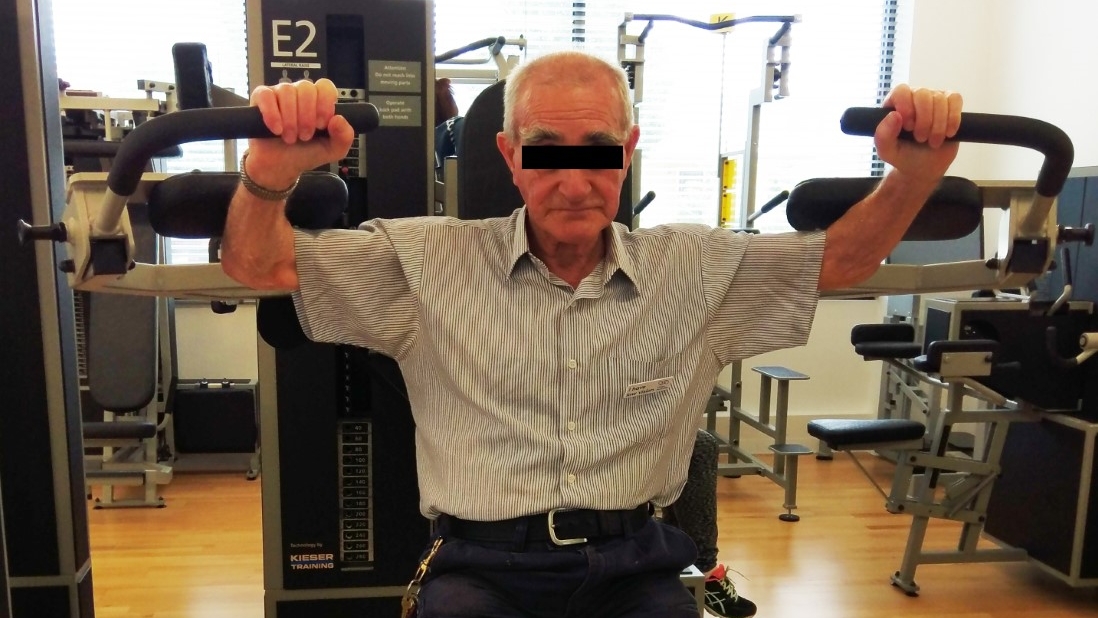Exercise is medicine – how heart surgery patients are bouncing back post-op

A heart surgery patient completing resistance training shortly after their operation.
In summary
- Heart surgery patients have been given new rehab hope, as study shows resistance training is safe just two weeks post-op
- Patients who undertake early resistance training recover quicker, within three months after surgery
- PhD student and Accredited Exercise Physiologist Jacqueline says there is an increasing body of evidence promoting more active recovery programs
For post-op heart surgery patients, the road to recovery can often be slow and frustrating, but new research conducted by Swinburne could have patients looking at their rehab charts with a new level of optimism.
Exercise is typically limited to light level activity for twelve weeks as patients recover from operations that have taken up to four hours to complete. But the new Swinburne study shows upper body resistance training can commence and be beneficial just two weeks after an operation.
Exercise like your heart depends on it
This game-changing research has been conducted by Accredited Exercise Physiologist Jacqueline Pengelly, who is Swinburne Physiotherapy’s first PhD scholarship holder.
Commencing just two weeks after heart surgery, Pengelly says the program included 12 weeks of resistance training, performed using both limbs simultaneously.
“Patients are often told to avoid or limit use of their arms and undertake walking, meaning they’re unable to perform or resume their daily or recreational activities, which can be a cause of frustration and feelings of loss of identity,” said Pengelly.

Accredited Exercise Physiologist and Swinburne PhD student Jacqueline Pengelly.
“Patients in the resistance training program reported feeling stronger and were motivated to keep trying to increase their workload. Because they were supervised, and their safety and recovery monitored, they gained the knowledge and confidence needed to recommence the activities they enjoy safer and earlier than minimal activity rehab programs.
“Mild cognitive impairment can affect up to 80 per cent of patients for months, or even years, leading to loss of independence and delayed recovery. Our study has shown that patients who undertake early resistance training recover quicker, within three months after surgery.”

Patients were closely monitored throughout the study and were only prescribed exercise within their physical ability.
Rehashing Rehab for the better
Jacqueline says there is an increasing body of evidence promoting more active recovery programs, as opposed to passive.
“It allows patients to become independent earlier in their recovery process, relying less on family/carers, which has a positive impact on both their physical and mental health.”
The future of post-op recovery
Jacqueline now has her sights set on conducting a larger study with more surgery and resistance training intervention sites using a range of resistance equipment.
“This would mean that resistance training is more accessible to patients and give exercise physiologists and physiotherapists the confidence to replicate the training within their own cardiac rehabilitation programs.
“Exercise is medicine – exercise physiologists need to carefully select outcome measures that are appropriate to the patient’s ability and use this information to prescribe exercises and exercise intensities that are appropriate. It’s time for change, so let’s get moving.”
Jacqueline expressed her gratitude to her research team, and the patients and cardiothoracic staff at the Royal Melbourne and Melbourne Private Hospitals, whose willingness to participate in the project, made these discoveries possible.
Research Team: Dr Jacqueline Pengelly, Prof Doa El-Ansary, Prof Colin Royse, Prof Alistair Royse, Prof Gavin Williams and A/Prof Adam Bryant
Team Kieser: Fenan Ghirmay, Brett Long and Tim Dettmann
-
Media Enquiries
Related articles
-

- Technology
- Health
New MedTechVic prototypes to transform everyday lives of people with a disability
Swinburne’s MedTechVic has revealed three new prototypes designed through the joint Health-led Manufacturing Innovation Program, in partnership with the Australian Medtech Manufacturing Centre and Safer Care Victoria
Friday 19 July 2024 -

- Health
- Education
Dissociation is a common trauma response among many who seek therapy, but only one in five psychologists can accurately identify symptoms
New Swinburne research has found that four in five Australian psychologists have gaps in their knowledge on dissociation and cannot accurately identify dissociation symptoms.
Friday 21 June 2024 -

- Health
- Technology
Clinical Innovation Fellowships develop creative solutions to Australia’s healthcare challenges
MedTechVic is gearing up to begin its fourth year of the Clinical Innovation Fellowship Program (CIFP), following the highly successful third round in 2023.
Wednesday 19 June 2024 -

- Social Affairs
- Health
Swinburne leads world-first medical cannabis driving trial
Swinburne researchers are spearheading a world-first trial to evaluate whether patients can drive safely while on prescribed medical cannabis
Tuesday 28 May 2024 -

- Technology
- Health
MChart redefines mental health service planning through cutting-edge data analytics
MChart, a new tool under development by Swinburne University of Technology and University of Canberra researchers, is set to help health care providers navigate the complexities of mental health service planning using data analytics and geospatial mapping.
Monday 13 May 2024

